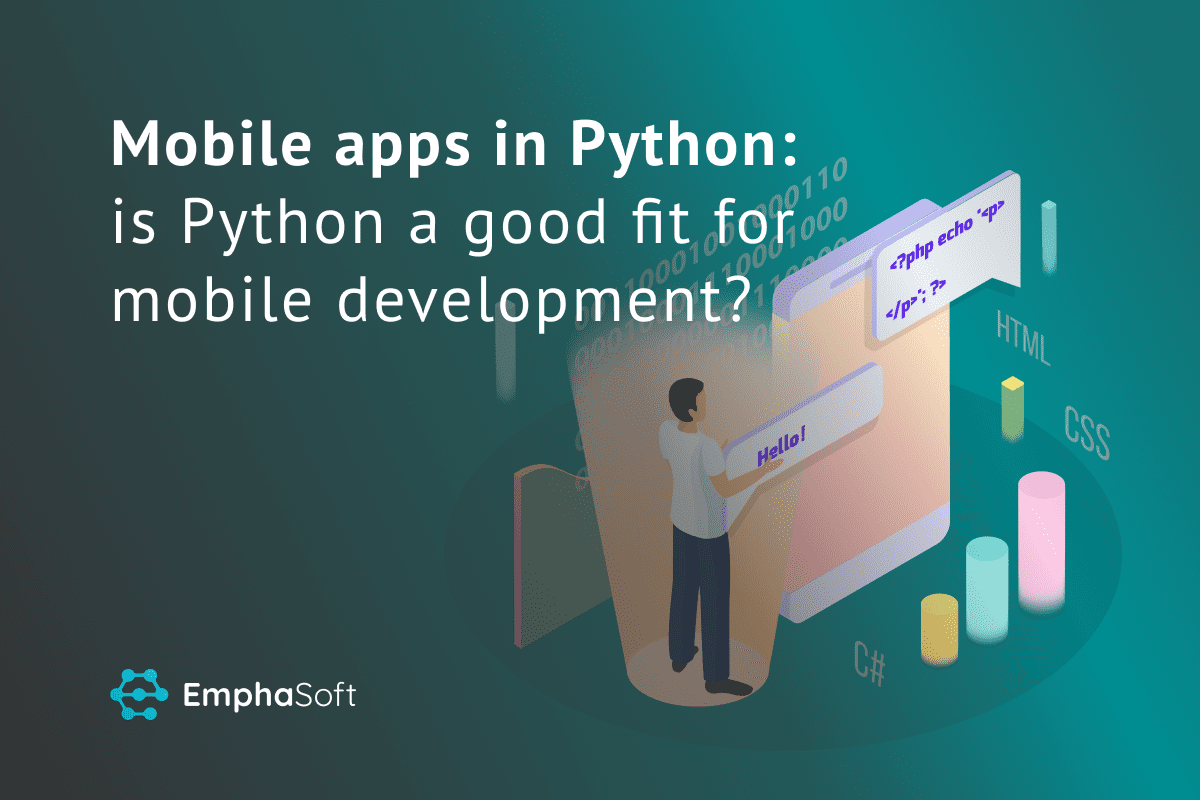Many mobile apps are built on Python, but is it really the best option for mobile app development in 2022? Today we will explore what types of apps you can develop in Python, the pros and cons of using Python, and what you should keep in mind when creating mobile apps with Python.
Brief overview of Python
Python is an open-source programming language that was introduced roughly 30 years ago. It is general-purpose, meaning that you can create many types of apps for multiple platforms with it. Python is also relatively easy to learn, making it a more accessible option for a wider range of programmers.
Additionally, Python allows cross-platform development, eliminating the need to create iOS and Android apps with different frameworks.
Benefits of Python for mobile app development
Python is one of the most popular programming languages, making it a good candidate for your mobile apps. Because of its popularity, there are plenty of resources online with great and up-to-date recommendations. With so many Python specialists available, you'll have no problem finding the programmer you need.
Even better, app development with Python offers the following benefits:
- Compatibility with the majority of systems and platforms, so the mobile app easily integrates with third-party tools.
- Supports multiple programming paradigms (procedural, object-oriented, and functional programming).
- An extensive Python standard library that removes the need to code for many features, allowing developers to copy-paste parts of the code, saving time and reducing development costs.
- Asynchronous code support.
- High level of security. Mobile apps developed on Python are less likely to be affected by cyber-attacks and tend to survive them better than apps built on alternative programming languages.
Creating apps with Python can help you maximise productivity with its ease of use, and its extensive libraries help optimise the process by reducing the time it takes to build a mobile app.
Examples of mobile apps built on Python
Python is a versatile programming language, and there are many types of mobile applications that can be built with it:
- Machine Learning apps
- Blockchain apps
- Business apps
- Social network apps
- Game apps
- Video apps
- System administration apps
Many large enterprises have trusted Python for mobile apps development.
One of the most popular and widely used apps, Instagram, is built on Python. Creating social media apps can be a challenge as it’s not easy to maintain and manage millions of users who create new content every second. Instagram also uses one of Python’s frameworks - Django to manage its users, allowing the app to run smoothly no matter the workload.
Many gaming apps are built with Python because it has lots of functionalities and add-ons that can be utilised to build versatile and engaging games. Among the gaming market leaders built on Python are Battlefield 2, Pirates of the Caribbean, and World of Tanks. Some of Python's favourite features used in gaming are tools for creating dialog trees and level systems.
Another example of a popular mobile app in Python is Dropbox. Everyone knows and loves this file hosting service that is fast, secure, and powerful - all thanks to Python.
Among other Python mobile apps, you will find Netflix, a blockchain app BurstIQ, Pinterest, Uber, and Reddit.
Tools for app development in Python
Python doesn’t have native mobile interface capabilities and is not supported directly by Android or iOS. But thanks to Python’s popularity, there are many tools that facilitate mobile app development, Kivy and BeeWare being the two most popular Python mobile app frameworks.
Kivy
Kivy is cross-platform and does not use native widgets, so all of them are custom-drawn. For users, this means that mobile apps built on Kivy will feel different than their native apps. Whether it’s good or bad would depend on how well your app is developed.
Kivy uses readable code and short syntaxes, and you can find many useful resources online, via an open-source Python library.
BeeWare
Unlike Kivy, BeeWare offers native interfaces for Android and iOS. Because BeeWare comes with a single codebase for multiple platforms, you can write the code once and deploy it across all platforms, saving you time and project costs.
Python in mobile QA testing
A popular use case for Python is mobile testing. Because the Python learning curve is rather simple and the community is active, it is a popular choice for many QA specialists with limited technical skills. Testing with Python allows us to target specific bugs and glitches or review the entire code, making it flexible and allowing us to run tests faster. It also supports different types of tests, so mobile apps turn out well-functioning and without major issues.
Python in prototyping
Python is also widely used in prototyping because it takes far less time to build a prototype with this programming language. A faster build means faster rollout and passing it on to users for testing. As a result, iteration and innovation processes become smoother, helping the company beat the competition and wow its clients.
Is Python suitable for developing mobile apps?
In the past, Python was sometimes criticised for not being the most optimised programming language to create mobile apps. With time, however, technology evolved making developing mobile apps with Python a much more enjoyable process.
Because Python is cross-platform it allows you to develop mobile apps faster and maintain them easier, keeping costs on the low end.
At the same time, Python is not native to both mobile platforms, so the development process can be somewhat difficult. However, this downside can be removed easily by partnering with an experienced mobile app development company, such as Emphasoft. Emphasoft has a team of professionals that has worked on many mobile app projects.
In general, Python is a great choice if:
- You need to build a secure mobile app fast and with a limited budget.
- You work with many interns and juniors.
- Mobile app with data analysis, image-processing, or voice and face recognition.
- Integrations with other languages, such as PHP or Java.
Final thoughts
Python is open-source, easy to comprehend and learn, and can be used for the widest range of mobile applications. It reacts well to heavy workloads and large amounts of data, making it a great choice for both niche and enterprise-level mobile apps. However, just because Python is a rather popular programming language doesn't mean that it’s the best option for mobile app development. Python works for some apps, but in some cases, you would be better off using a different language.
The Emphasoft team has profound experience with Python application development and many other programming languages, and our specialists can pick the best framework for your future app. Outsourcing mobile app development will free up your valuable time, allowing you to focus on key business processes while Emphasoft works on your mobile app.
Whether you choose to build a Python mobile app in-house or outsource, you will be able to benefit from its ease of use and extensive resources available, as well as the large pool of specialists on the market. Overall, Python is very accessible, agile, and works well for various needs, so most startups and businesses can use it to build their mobile apps.
Read more: iOS and Android App Development Comparison









 Schedule a Discovery Call
Schedule a Discovery Call Schedule Call
Schedule Call